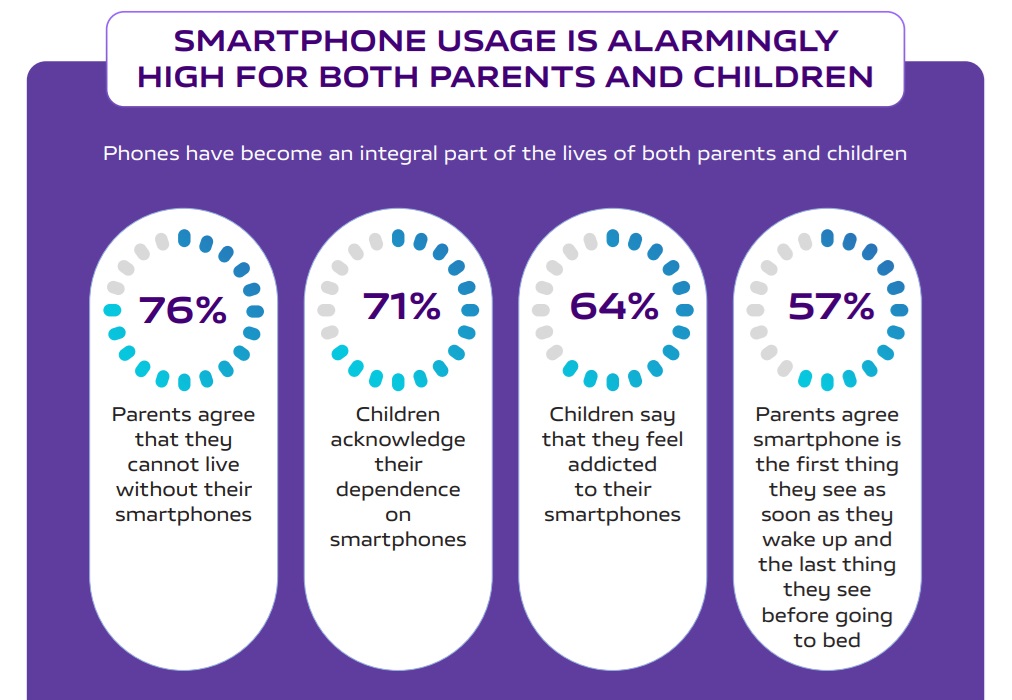Indian Children Call for 'Parental Controls' on Smartphone Use in the survey. Key Findings Highlight Impact of Excessive Smartphone Usage on Parent-Child Relationships
Indian children are more conscious of the negative effects of excessive smartphone usage than their parents, a recent survey finds. The study, titled ‘Impact of Smartphones on Parent-Child Relationships,’ by Vivo in partnership with CyberMedia Research (CMR) highlights how smartphones significantly affect family dynamics, with 69% of children identifying phone usage as a major source of conflict with their parents.
The study reveals that Indian children are more aware of the negative impacts of excessive smartphone use than their parents.
Alarming Insights into Parent-Child Smartphone Dynamics
The survey underscores the paradox of smartphones as essential yet disruptive tools in family lives:
Mutual Acknowledgment of Issues: While 73% of parents and 69% of children acknowledge smartphone usage as a source of conflict, children are more vocal about the problem, with 76% wishing for deeper connections by reducing screen time.
Time Spent on Smartphones: On average, parents spend over five hours daily on their phones, while children spend over four hours. Both groups report heavy use of social media and entertainment platforms during these hours.
Children’s Perspective: 94% of children suggested that ideal smartphones for parents should focus on essential features like calling, messaging, and camera, deliberately excluding entertainment, gaming, and social media apps.
A Call for Responsible Usage
The findings reveal a collective yearning for stronger family bonds, with 84% of parents and 76% of children expressing a desire for more meaningful connections. However, the unregulated use of smartphones during social occasions—vacations, family outings, and celebrations—has strained personal relationships.
Geetaj Channana, Head of Corporate Strategy at vivo India, emphasized: "Technology should foster connections, not hinder them. This year’s findings remind us to pause, disconnect, and prioritize moments of genuine togetherness.”
Riddhi Doshi Patel, a child psychologist, validated the study’s findings, emphasizing the silent emotional drift caused by excessive phone usage in families. “By embracing mindful tech habits, we can foster stronger emotional bonds and create homes where relationships thrive beyond screens,” Patel noted.
Q: Will I clear the CBSE board exams 2025 if I obtain 33 percent in theory but not in practicals separately?
Q: I got 74% marks in top 4 subjects in 12th (Science) CBSE .. What should I do now ?
Q: How many subjects should be included while calculating class 12th CBSE board percentage?
Key Data Points
Smartphone Usage and Perceived Addiction
76% of parents and 71% of children admitted they cannot imagine living without their smartphones.
64% of children feel addicted, with social media dominating their screen time.
Two-thirds of children said they would quit social media if their friends did the same.
Impact on Relationships
66% of parents and 56% of children noticed negative changes in their relationships due to excessive smartphone use.
Parents expressed concern about children’s ability to form meaningful relationships, often overlooking the impact of their own habits.
Efforts Towards Change
69% of families reported positive outcomes from setting screen-time boundaries and establishing phone-free zones at home.
77% of children and 55% of parents advocated for no phone use during family time.
The survey covered 1,543 respondents across major Indian cities, including Delhi, Mumbai, Kolkata, Chennai, and Bangalore. It reflects vivo’s commitment to fostering human connections as the company celebrates a decade in India. This study is a wake-up call to prioritize genuine relationships over virtual distractions, urging families to reclaim their time and attention for each other.
Read More:
Follow Shiksha.com for latest education news in detail on Exam Results, Dates, Admit Cards, & Schedules, Colleges & Universities news related to Admissions & Courses, Board exams, Scholarships, Careers, Education Events, New education policies & Regulations.
To get in touch with Shiksha news team, please write to us at news@shiksha.com

Abhay an alumnus of IIMC and Delhi University, has over a decade long experience of reporting on various beats of journalism. During his free time he prefers listening to music or play indoor and outdoor games.
Latest News
Next Story


No. It is necessary that you score a minimum of 33 percent in practical and theory exams separately. In case you're unable to score the minimum marks either in theory or practicals even when the total aggregate is 33 percent, you won't be considered pass.